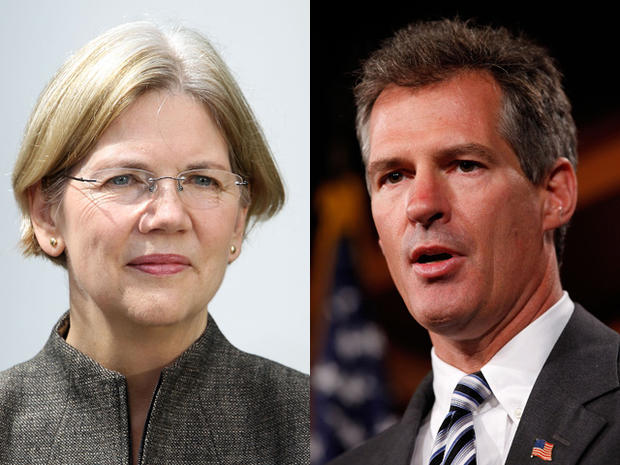Poll: Brown, Warren neck-and-neck in Massachusetts Senate race
A new poll from the Boston Globe is confirming what many political spectators have believed for months: the Massachusetts Senate race between Democrat Elizabeth Warren and Republican Scott Brown is looking to be very, very close.
According to the survey, conducted from March 21-27 among 544 voters, the two are in a statistical dead heat: Brown earned 37 percent support to Warren's 35 percent support - which falls well within the poll's +/- 4.2 percent margin of error.
Notably, 26 percent of voters said they had not yet made up their minds. Among those who had made up their mind, the survey results remained similarly close: Brown holds a 51-48 percent edge over Warren, again within the poll's margin of error.
The race is expected to be one of the most closely-watched in the country: Warren, a consumer advocate who spearheaded the beginning of the Obama administration's Consumer Financial Protection Bureau (CFPB), is seen as a liberal icon and rising star in the party. Brown, an incumbent Republican who won the seat in a special election following Ted Kennedy's death, has built his reputation as a moderate Republican who's not afraid to break party lines. Both candidates have touted strong values as political selling points, and have proven themselves to be powerful fundraisers with strong party backing.
Still, neither candidate has yet been able to claim front-runner status. While Warren's outspoken support for issues like gay marriage and financial reform have earned her enthusiastic support among liberals, it's unclear how some of her views will play among Massachusetts' more moderate working class voters. Brown, meanwhile, seeks to maintain his support among moderate and conservative Democrats - a demographic that helped lead him to victory in 2010 in the solidly blue state.
According to the Globe survey, both candidates have strong support among certain key groups. Brown performs well among independent voters, who backed him over Warren nearly 3-1, while most moderate and conservative Democrats opt for Warren.
Both candidates have high favorability ratings: 54 percent of respondents said they viewed Brown favorably, and 47 percent said the same of Warren. For Brown, that number is a slight uptick from August 2011, when he had 49 percent favorability. Warren's favorability rating, however, has doubled in the same period. In August 2011, only 23 percent of voters viewed her favorably; 60 percent, meanwhile, said they didn't know enough to say, which likely reflected a lack of name recognition for Warren at the time.
And while Warren certainly remains less well-known than Brown - in the March survey, 25 percent of Massachusetts voters opted "don't know" when polled on her favorability, while only 7 percent said the same of Brown - the numbers would suggest that people increasingly know who she is.
One area in which Brown excels that could be significant, however, is likeability, in which he outranks Warren 57 percent to 23 percent. He is also seen as more bipartisan than Warren.
Warren, on the other hand, is perceived as the candidate who would do more for working people. She also has strong support among Democrats, liberals, upper-class voters, and those with a post-graduate degree.
Ultimately, the contest between the two candidates - two nationally well-known figures with strong party support and substantial campaign coffers - will likely be neck-and-neck all the way to Election Day.
Andrew E. Smith, the director of the University of New Hampshire's Survey Center, which conducted the poll, told the Globe that the race remains "wide open."
"Unless something dramatic happens, this will go down to the wire," he said.

